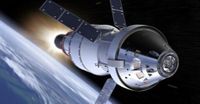In a groundbreaking partnership, American companies Exlabs and Antares are set to revolutionize deep space exploration with the development of nuclear-powered spacecraft. According to SpaceNews, the duo aims to create vessels that harness nuclear power, vital for long-duration missions beyond the confines of Earth's atmosphere.
The first nuclear-powered vehicle from this collaboration is anticipated to launch between 2028 and 2029. ExLabs indicated that this inaugural mission will not just be a step forward in technology but an essential test of nuclear space travel. It aims to lay the groundwork for broader adoption of nuclear technologies within space industries.
Matthew Schmidgal, CEO and co-founder of ExLabs, emphasized the importance of nuclear power, stating, "Nuclear power is the key to enabling long-term, sustainable space missions." This sentiment comes as the space sector continues to seek innovative solutions to support ambitious projects, including missions targeting nearby asteroids.
While ExLabs is preparing for its initial missions, such as exploring the asteroid (99942 Apophis), they will not utilize nuclear-powered vessels right away. Instead, the spacecraft planned for scientific exploration, known as the Space Exploration Research Vehicle (SERV), will rely on a nuclear engine, a significant milestone in the evolution of space travel.
In a broader context, the U.S. military's interest in nuclear propulsion for space travel has been underscored by recent actions. In October 2023, the U.S. Joint Forces Research Institute signed several contracts with American companies dedicated to designing space vehicles powered by nuclear technology. This initiative showcases a growing recognition of the strategic advantages offered by nuclear propulsion, particularly in deep space endeavors.
Adding to this momentum in nuclear space exploration, European endeavors are also noteworthy. The European Space Agency (ESA) has plans to launch its own nuclear-powered spacecraft around 2035, signaling a global trend as nations recognize the potential of nuclear technology in overcoming the challenges posed by long-duration space missions.
With the ambition of both American and European agencies ramping up, the prospect of nuclear-powered missions is becoming a reality. The collaboration between Exlabs and Antares is positioned at the forefront of this transition, potentially changing how humanity explores the cosmos.
As developments continue to unfold, the groundwork being laid now will undoubtedly shape the future of space exploration, with nuclear energy emerging as a key player. The race toward advanced space technologies illustrates a commitment to achieving sustainable and efficient exploration in the years to come.





